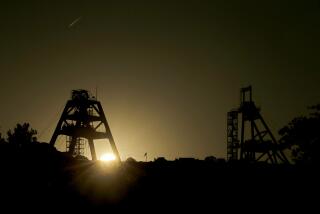Surprise Administration Move May Help Miners
What goes on here?
All of a sudden, the anti-union Bush Administration seems to be riding to the rescue of the badly crippled United Mine Workers of America, which is embroiled in a crucial struggle against what has been an implacable foe, Pittston Coal Co.
For six months the Administration callously ignored the bitter and costly miners strike. It has disrupted the economies throughout Virginia, West Virginia and Kentucky and resulted in the arrest of nearly 4,000 union members, mostly for acts of civil disobedience.
Finally, the Administration intervened last week and now there seems to be a good chance of ending the UMW’s struggle for survival.
Bush’s Labor Secretary Elizabeth Hanford Dole appointed the remarkably successful Bill Usery as “super-mediator” in the war that was showing no signs of an early peace.
But Usery, who has had 40 years of experience in labor-management relations, says he hopes a settlement can be reached soon enough for the miners to go down into the mines again before Christmas.
The super-mediator could fail, of course. But those who know Usery well believe that some behind-the-scene conversations must have led him to his optimistic prediction, even though no one is saying exactly what those conversations might have been or who took part in them.
However, here are what might be called some educated guesses:
Dole is a bright, politically ambitious Republican herself, as is her husband, Sen. Bob Dole (R-Kan.), the Senate minority leader who ran for President in 1988.
It’s unlikely that she would have jumped into the Pittston fray without some pretty clear signals that her move would bring political kudos and sighs of relief from both sides in the exhausting battle.
One faint signal that the Administration’s intervention might help end the strike could have come from the company, because the walkout has been effective and a serious economic drain on the company.
But Pittston has shown no public sign of a willingness to make even a gesture of compromise so far and instead apparently remains intent on breaking the strike, if not the union.
Pushing the Administration into its belated intervention is the real possibility that Congress may soon pass a bill that would force Pittston to retreat on a key issue in the dispute: health-care benefits for miners who retired before January, 1976.
The proposed measure was introduced by Sen. Jay Rockefeller (D-W.Va.) and several other influential Democratic and Republican senators from coal states.
The bill would require Pittston to resume contributions to a multi-employer fund that provides health-care benefits for those retirees. The company stopped paying into the fund in February, 1988, thereby giving it a competitive advantage over other coal companies whose contributions may have to increase to make up for the loss from Pittston.
If Pittston is able to keep that advantage, the other companies would almost certainly try to drop out of the fund, too, probably sparking a nationwide coal strike.
The proposed law could avert that threat, but so would a settlement of the dispute by the union and company, and the Administration would get credit for that achievement.
Some cynics may feel that Dole may be using Usery, with his national reputation as a peacemaker, only as a public relations gesture to show that the Administration is concerned about the impact of the strike.
But that is unlikely because Usery isn’t gullible, and, in fact, the most interesting reason for believing that the damaging strike could end soon is the personal and business philosophy of Usery.
He is a true believer in the idea that America is best served when labor and mangement work cooperatively, and he has said repeatedly that he would never be involved in helping a company destroy a union.
After serving for 16 years as a staff executive of the International Assn. of Machinists, Usery moved into government service and held such posts as secretary of labor and director of the Federal Mediation Service during the Republican administrations of Gerald R. Ford and Richard M. Nixon.
Now he is a private labor relations consultant for management, but his clients know that while he will drive a hard bargain for management, he will take their cases only if they want peace, not war, with labor.
That personal philosophy also helps him gain clients, because most labor consultants for management will work either for peaceful settlements of labor disputes or to break unions, depending on the clients’ orders. Usery doesn’t play both sides of management’s game.
So when he accepted Dole’s assignment as a super-mediator in the lengthy coal strike, it is almost certain that he had some assurance that Pittston is finally ready to end its stubborn resistance to any compromise and negotiate a contract settlement with the embittered mine workers.
The strike is hurting the company and causing serious economic and emotional problems for members of the union that was founded a century ago by the legendary labor leader John L. Lewis.
Whatever the motives were for the Bush Administration and Dole to intervene in the dispute, they will deserve praise if Usery succeeds in his mission to end it.
The Administration would be entitled to even more praise if it then moved to help resolve the efforts by Frank Lorenzo to break the unions at Eastern Air Lines.
More to Read
Get the L.A. Times Politics newsletter
Deeply reported insights into legislation, politics and policy from Sacramento, Washington and beyond. In your inbox three times per week.
You may occasionally receive promotional content from the Los Angeles Times.










